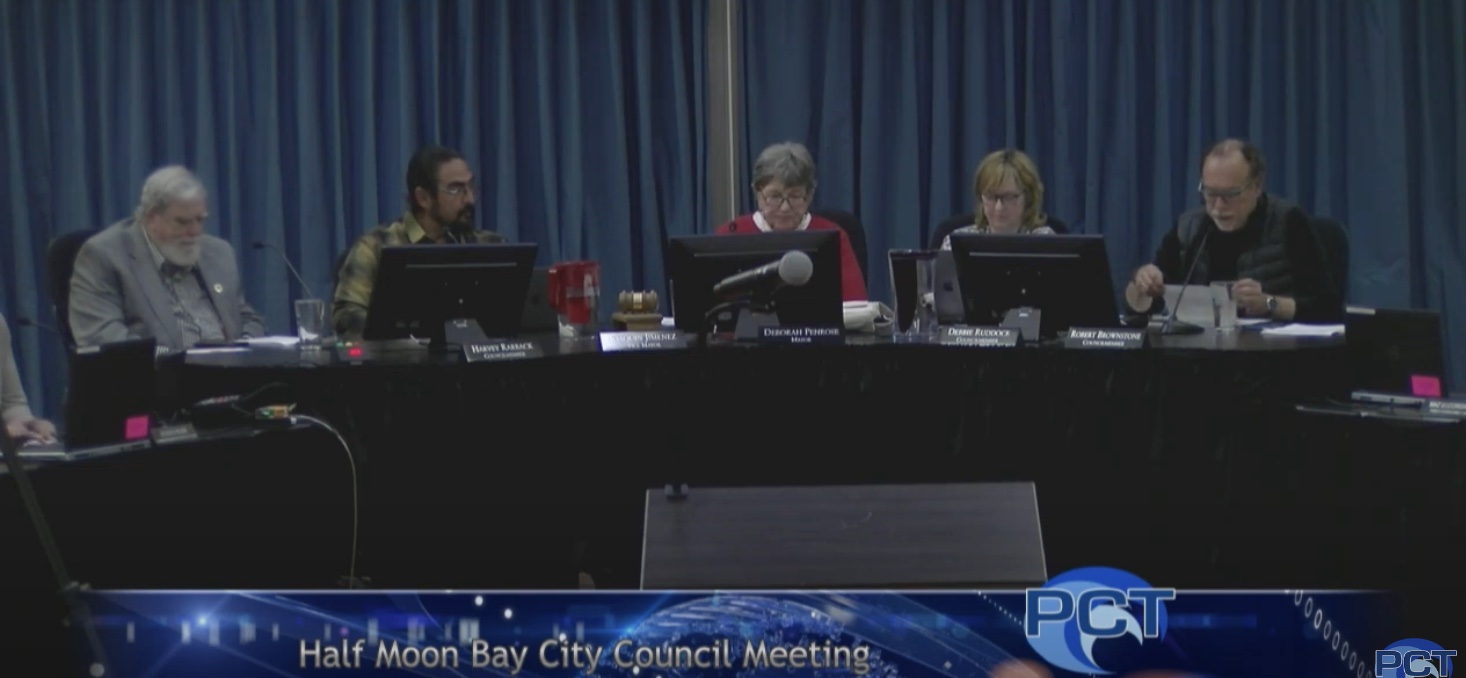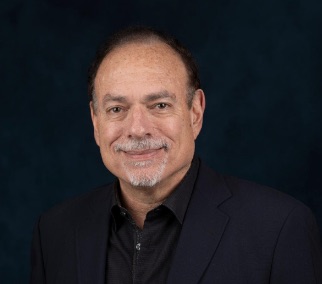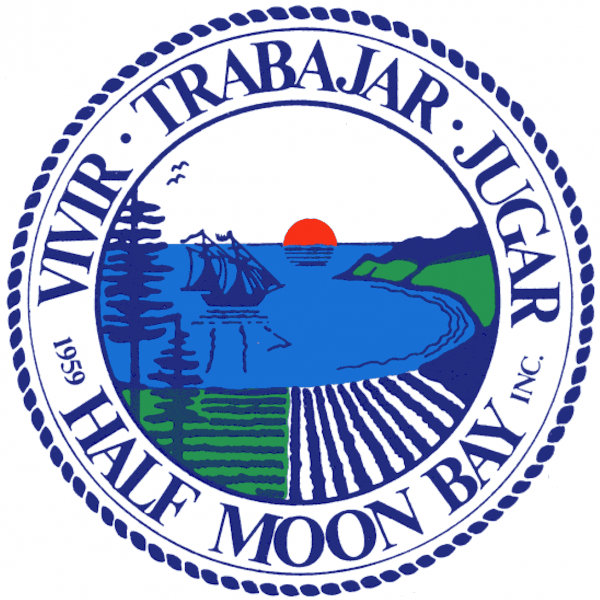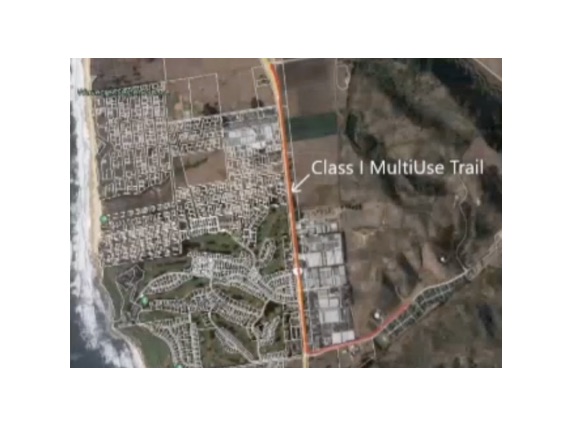|
Getting your Trinity Audio player ready...
|
VIDEO. From the Half Moon Bay City Council meeting on Tuesday, July 18th, 2023 at 7:00pm, as a hybrid meeting.
HMB Mayor, Deborah Penrose, introduces the agenda item. Maz Bozorginia, Public Works Director/City Engineer and Kenneth Stiles, Finance Manager report.
The yearly charge will go from $1056 to $1,188 for 2023/2024 fiscal year. These charge increases are based on the HMB 2020 Sewer Rate Study.
Staff Recommendation: Conduct a public hearing and adopt a resolution approving the Fiscal Year 2023-24 Sewer Service Assessments and charges, direct staff to file the assessment roll, and authorize the County Controller to place the assessment charges on the County of San Mateo Property Tax Roll and direct staff to bill assessments directly that are not on the tax roll.
TO: Honorable Mayor and City Council
VIA: Matthew Chidester, City Manager
FROM: Maz Bozorginia, Public Works Director/City Engineer Lisa Lopez Rossi, Administrative Services Director Kenneth Stiles, Finance Manager
TITLE: FISCAL YEAR 2023-24 SEWER SERVICE CHARGES AND ASSESSMENTS
FISCAL IMPACT
In June 2020, the City Council adopted new sewer service charges for Fiscal Year 2020 – 2021 (FY21) through FY25 (five years) as part of its California Proposition 218 sewer services charges study and protest process. The adjustments were necessary to address increasing costs of the Sewer Authority Mid-Coastside and the need to maintain and improve the City’s sewer collection system. The total FY 2023-24 revenues are projected to be approximately $6.3 million.
Due to inflation and deferred capital improvements, Sewer Authority Mid-Coastside (SAM) related costs in FY 2023-24 are budgeted at $4.5 million, representing a 7% decrease from the prior year. The total City sewer operation costs are budgeted at $6.5 million, representing a 4.8% increase overall. As was identified in the adopted rate study, the City is utilizing funds derived from assessments and charges for service past and present to meet annual operational funding. Annual operational funding includes capital expenses and operational expenses by both the City and SAM.
BACKGROUND AND OVERVIEW
The City’s collection system includes approximately 35 miles of gravity sewer lines, three (3) pump stations and three (3) force mains. Wastewater from residences, businesses, schools, restaurants, and other buildings and uses is conveyed through sewer mains owned by the City of Half Moon Bay to the sewer treatment plant operated by Sewer Authority Mid-Coastside (SAM). The City collection system serves residences, businesses, and public uses from Frenchman’s Creek in the north to Miramontes Point Road in the south. The City primarily serves properties located in the incorporated area; however, the City serves some adjacent areas outside City limits including the Moonridge Affordable Housing Development.
The City, Granada Community Services District (Granada), and Montara Water and Sanitary District (Montara) form the Sewer Authority Mid-Coastside via an exercise of Joint Powers Authority (JPA). SAM facilities include a conventional wastewater treatment plant (located at 1000 N. Cabrillo Highway, Half Moon Bay) and the Intertie Pipeline System (IPS), which conveys flows through pumping facilities, force mains, and interceptor pipelines from Granada and Montara service areas to the wastewater treatment plant. Under the current JPA, the City is responsible for paying a proportional share of the plant flow for operations, maintenance, and capital costs of the wastewater treatment plant. In the current fiscal year, the City’s proportional share of operations and maintenance is set at 61.5%.
The regional wastewater treatment plant was originally constructed in the late 1970s, following the formation of the JPA. The treatment plant was substantially upgraded in late 1999/early 2000 and has sufficient capacity to receive and treat anticipated wastewater flows. The treatment plant requires major capital repair/replacement efforts which have been estimated between $30 and $40 million. This rate study assumes funding of capital repair and replacement on a pay-as-you-go basis for the foreseeable horizon. The rate study anticipated holding at roughly $2.5 million in combined annual contributions for capital repair/replacement from the City, Granada, and Montara; in FY 2022-23 this figure was $3.0 million. In FY 2023-24, SAM has budgeted $1.7 million in combined capital funding, of which the City is currently obligated to share 61.5%, or $1.06 million.
The IPS was constructed in the late 1970s and is, for the most part, comprised of original system components. In 2017, the Granada Force Main suffered a major break and resulted in a significant sanitary sewer spill (SSO). Two smaller SSO events occurred on other sections of the Granada Force Main. As a result, SAM completed replacement of approximately 5,700 feet of the Granada Force Main at a cost of almost $2 million. SAM recently completed work on an additional 1,500 feet of the Granada Force Main. Pursuant to settlement terms with the Ecological Resource Foundation (ERF), SAM remains committed to a series of studies and possible replacements of the IPS over the coming years totaling an estimated $10 million. Total IPS repair and replacement is conservatively estimated between $20 and $25 million. To date, City ratepayers have contributed (under protest) approximately $5.6 million toward IPS related repair/replacement since 2017. Under a recent trial court decision that is currently on appeal, City ratepayers would expect to pay approximately 60% of all costs related to the IPS replacement, absent reversal by the Court of Appeal.
Additionally, due to the 2022/2023 Winter Storms, the Montara Force Main had a spot failure in a critical segment in Moss Beach that resulted in SSO’s and a shutdown of the system to repair. This failure was surprising, given that SAM staff and their consultant engineer (SRT) prepared a condition assessment for the Montara Force Main back in 2021 that stated that the pipe was in good condition and no immediate replacement was necessary. After the atmospheric rivers, SAM staff and member agencies started to look closely at the condition and are awaiting results of a forensic assessment. SAM did authorize a contract with SRT to start design and environmental work, and the City awaits an update on that progress.
SEWER ENTERPRISE FUND OVERVIEW
The City’s Sewer Fund is a government enterprise fund. An enterprise fund is a self-supporting government fund that provides a specialized service. In this instance, City sewer services represent the specialized service; the Sewer Fund is the City’s only enterprise fund. The Sewer Fund is shown in the City’s Annual Operations Budget as two separate accounts: Fund 201 (Operating Fund); and 202 (Sewer Capital Fund). The separation exists primarily to ensure that sewer capacity fees paid by private development are accounted for and utilized solely for their intended capital purposes. The two funds also provide a basis for annual budgeting toward operating and capital expenditures. Per the Rate Study, the City Council committed to maintaining an Operating Reserve equal to 75 days (app. 20.5% of budget) as well as a Capital Improvements Reserve of up to 2% of Net Total capital Assets.
99% of sewer system (utility) revenues is derived directly from rates charged to the users of the sewer system. Per state law, sewer service charges are permitted to recover only revenues sufficient to adequately fund sewer utility operations, maintenance, and capital replacement expenditures including maintenance of emergency and capital reserves. As noted, the City’s sewer service charges include not only the operation and maintenance of the City collection system, but also the proportional costs of operating and maintaining the Sewer Authority MidCoastside (SAM) (including the treatment plant and intertie pipeline system).
Operations and maintenance costs for sewer services have increased significantly over the last seven years. Between FY 2015-16 ($2,299,898) and FY 2019-20 ($4,131,899), Half Moon Bay’s proportion of SAM budgeted costs alone have almost doubled. Additionally, the City’s share of the costs during this same time-period has increased by more than 10%. As noted above, the City’s FY 2023-24 SAM related costs increased by approximately 15% over FY 2022-23 assessments. SAM related increases are attributable to many factors including added staffing and related cost increases, addressing deferred maintenance at the plant, and the rapidly increasing cost of materials and labor for capital construction and maintenance.
The City’s collection system operating costs have also risen in response to statutory oversight obligations, addressing long deferred maintenance, providing oversight of operations and maintenance, and to account for the rapidly increasing cost of materials and labor for capital construction and maintenance. In 2021, the City Council completed construction of the Ocean Colony Pump Station and Force Main Project (app. $2.5 million total cost). This project was identified by the City and funded by all ratepayers to replace aging infrastructure/technology and protect the environment in the Ocean Colony community. Additional capital maintenance and repair will continue to be needed to protect the environment, limit liability, and meet statutory obligations. The City is actively engaged in identifying and addressing inflow and infiltration (I & I) within the system including annual manhole repair/replacement and smoke testing. The City is also proactively managing and maintaining its sewer collection assets through the cleaning and maintenance activities as well as through in annual CCTV inspections of in-ground pipes (CCTV also serves to evaluate potential I & I related issues). Since FY 2018-19, the costs of providing services exceeded the revenues derived from sewer service charges.
Beginning in September 2019, the City initiated work with Municipal Financial Services (MFS) to prepare a sewer service charges study for the City sewer system. The study (“2020 Sewer Service Charges Study”, dated April 7, 2020) was released in April of 2020 and was subsequently accepted and adopted by City Council in conjunction with the Proposition 218 protest hearing on June 2, 2020. MFS financial modeling indicated that by FY 2022-23, without rate adjustments, the Sewer Fund (Funds 201 and 202) would be exhausted, and revenues would not be sufficient for day-today operations of the sewer enterprise. The Study assumed the terms of the then anticipated (and since failed) Settlement Agreement with Granada and Montara. The rate study also incorporated the annual transfer of funds from Fund 202 to Fund 201 over the course of the five fiscal years. Given the failure of settlement, inflation and overall increasing costs of SAM, the City is contemplating a new rate study to commence later this fiscal year.
On June 2, 2020, the City Council conducted a required public protest hearing on proposed sewer charges adjustments. Following the hearing, the City Council adopted new sewer service charges and methodology for calculating residential charges. In approving the new rates the City Council found the following: 1) All provisions set forth above are true and correct, and are hereby incorporated herein as findings of this City Council by reference; 2) The purposes of the fees and reserves set forth herein are to finance the wastewater system service costs; 3) There is a need for wastewater system services to protect the public’s health, safety, and welfare; 4) The charges do not exceed the cost of providing wastewater system services including basic costs, proportional costs, and allocated costs, and do not exceed the proportional cost of service attributable to the customer’s parcel; and 5) The City did not receive a majority protest of the parcels currently receiving wastewater services.
In July of 2020 and 2021, the City Council Conducted public hearings and adopted resolutions approving the annual Sewer Service Assessments and charges per the adopted rate study.
DISCUSSION
Sewer service charges are utilized to maintain and operate the City’s sewer collection system and to fund the City’s portion of the SAM operations. As noted earlier, the City is directly responsible for maintaining the system which collects and conveys wastewater, while SAM provides treatment services. The sewer service charges include funding of capital repairs, replacements and improvements both within the City system and the SAM treatment plant. Over the last seven years the cost of SAM JPA services has increased substantially. Additionally, the City has programmed necessary capital projects that have grown increasingly more expensive (due to increased material costs, size of the projects and limited capacity of contractors in Bay Area).
The FY 2023-24 assessments represent the third assessment under the 2020 adopted sewer service charges. FY 2023-24 includes an increase in rates by 13% over the prior year. Detailed discussion of the rate setting process can be found in the City Clerk archives for City Council agendas and packets for March 17, 2020, April 7, 2020, and June 2, 2020. Additional background can be found on the City’s website.1
The City of Half Moon Bay collects sewer service revenues in two ways:
1. Property owners’ sewer assessments are added to the tax roll by the San Mateo County Tax Collector (pursuant to Section 5473 of the Health and Safety Code of the State of California). This year, individual assessments of 3,292 parcels are projected to generate $6,035,528.88 in revenues which will be forwarded to the City of Half Moon Bay as part of the San Mateo County tax roll collection.
2. The City also directly bills property owners who are connected to the City sewer system but are not included in the City of Half Moon Bay’s assessments which are collected through the San Mateo County Property Tax Roll. This applies to unassessed government properties and to properties outside of Half Moon Bay city limits that use the City’s sewer system. Another $273,489.56 in revenue is projected by billing 172 properties directly.
Staff recommends that the City Council conduct a public hearing and upon closing of the hearing, direct staff to file the assessment roll; authorize the County Controller to place the assessment charges on the San Mateo County Property Tax Roll this year; and direct staff to bill sewer users directly if they are not assessed on the tax roll.
City Council of Half Moon Bay Meets ~ 1st and 3rd Tuesdays at 7:00pm
The City Council of Half Moon Bay is the City’s governing body, and consists of five elected members. The Council sets priorities and policies, makes final decisions on all major City matters, adopts ordinances and resolutions, appoints the City Manager and City Attorney, and approves the annual budget.
City Council members are elected at-large to four-year, overlapping terms. There are no term limits in Half Moon Bay. The City Council selects one of its members to serve as Mayor and one to serve as Vice Mayor, on an annual basis.
The Half Moon Bay City Council typically meets on the first and third Tuesday of each month starting at 7 pm at the Ted Adcock Community Center, 535 Kelly Avenue.

- streamed live on Comcast Channel 27 and Pacific Coast TV website
- the City’s website online (via Granicus)
- and on Facebook Live
- one in English (City of Half Moon Bay FB Page)
- one in Spanish (City of Half Moon Bay Recreation FB Page)
- Recorded by Pacific Coast TV (PCTV)
Members or the public are welcome to submit comments (in accordance with the three-minute per speaker limit) via email






